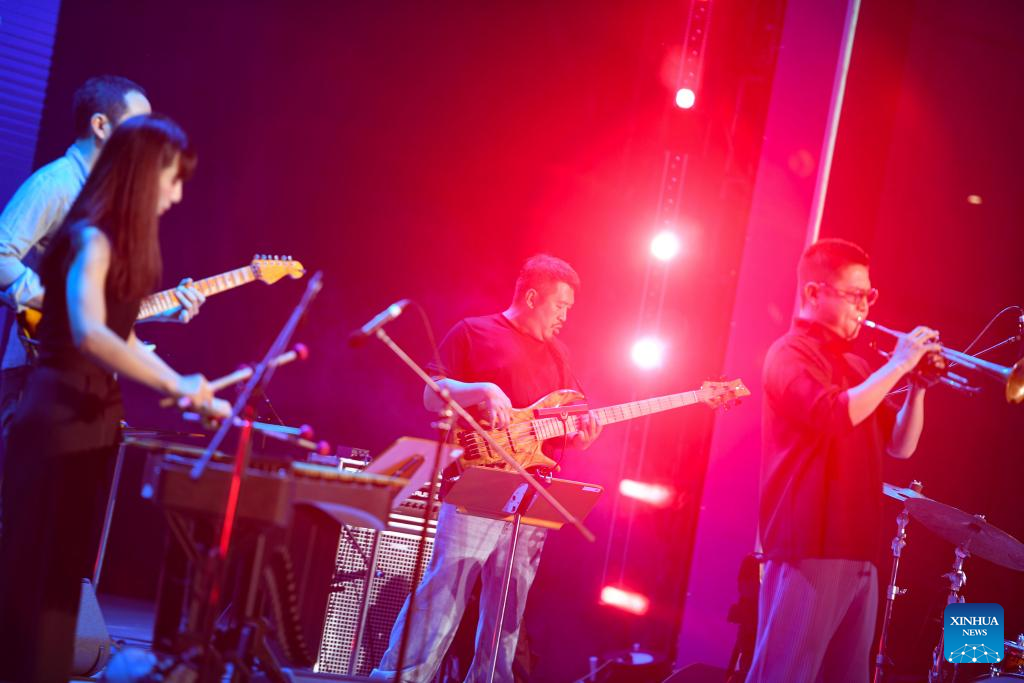
 0 Comment(s)
0 Comment(s) Print
Print E-mail Xinhua, May 27, 2024
E-mail Xinhua, May 27, 2024

Li Xiaochuan (1st R), a renowned Chinese jazz trumpeter, performs at the 2024 Taihu Jazz Festival at the Taihu Stage Art Center, a branch of China's National Center for the Performing Arts (NCPA) in Beijing, capital of China, May 22, 2024. (Xinhua/Chen Zhonghao)
As dusk fell, Laurent Maur and his band began their show, enveloping the audience in a graceful jazz sound created by rhythmic drumming and an interweaving melody of harmonica and flute, dissolving the summer fatigue.
The performance by Maur, a French harmonica player, marked the opening of the 2024 Taihu Jazz Festival, a five-day event that began on Wednesday at the Taihu Stage Art Center, a branch of China's National Center for the Performing Arts (NCPA) in Beijing. The festival has welcomed over 200 jazz musicians from home and abroad.
Liu Mingxin, a Beijing resident and jazz enthusiast, hurried to the jazz festival in Tongzhou District with her friend immediately after finishing work. "We often attend concerts and music festivals together. Jazz makes me feel relaxed and I can really feel the music," said the 30-year-old.
During his performance, Maur enthralled the audience with his original creations themed on Sino-French friendship. "Music possesses incredible power to connect people from different countries, and I believe it also plays a very important role in cultural exchanges between China and France," he said.
Maur holds a profound love for China. Since 2010, he has made numerous trips to the country, including a 28-day performance tour across 24 cities. "When we performed in China, the audiences were very enthusiastic and really got into it," he said.
Launched in 2021, the Taihu Jazz Festival has been held for four years now. Li Xiaochuan, a renowned Chinese jazz trumpeter, is a regular attendee. This year, he performed a variety of original music infused with Chinese elements.
Compared to other music genres, jazz appears more niche. According to Li, jazz emerged in Shanghai during the 1920s and 1930s and experienced a thriving period in Beijing during the 1990s. Today, jazz has also gained popularity in Chinese cities such as Guangzhou, Shenzhen, Xi'an and Chongqing.
"Jazz is a universal language with inclusiveness, and in China, it is reaching ordinary audiences," said Li, adding that it is the rise of jazz festivals and clubs, as well as jazz education, that is promoting jazz in the country.
Having performed both at home and abroad, Li, 42, found that compared with their foreign counterparts, Chinese audiences are younger and more curious about jazz, providing a positive impetus for the industry.
"I noticed in China that young people go to jazz shows, which is great," said Balazs Bagyi, a Hungarian jazz drummer, who was also invited to perform at this year's jazz festival.
"In Western Europe and North America, jazz audiences are getting older and older, but here in China, we have new audiences," said Bagyi. "Some people think jazz music is for the trained ears, but I think it is for the open heart and open mind."
According to Guan Jianbo, vice president of the NCPA, to make jazz more accessible to the public, this year's jazz festival has set up three affiliated stages that are free to visitors, inviting more than 40 young jazz bands to perform.
Jin Zhilin, a junior majoring in vocal jazz at the Beijing Contemporary Music Academy, started a jazz band with her peers last year, and they have prepared eight songs to perform at the jazz festival.
"This is our first time to participate in the jazz festival. I think it is a great opportunity to let more people know about jazz as well as our band, and we really cherish the stage," she said.
Living close to the Taihu area, Chen Jianlin and his wife came to enjoy the performances of young jazz bands while taking a leisurely stroll nearby. "The music festival enriches our daily lives, and I am looking forward to more activities like this," said the 39-year-old.
"For the audience, jazz is not only a music genre, but also reflects a way of life," said Hu Na, associate professor at the National Academy of Chinese Theatre Arts. According to her, the development of jazz in China is attributable to the diverse needs of the Chinese music market and audience groups, as well as the Chinese government's efforts to foster an open and inclusive environment for cultural exchange.
According to data from the China Association of Performing Arts, the number of large and medium-sized concerts and music festivals (with more than 2,000 audience members) nationwide reached 5,600 in 2023, an increase of 100.36 percent compared with 2019. Accordingly, the total number of attendees reached nearly 35.52 million, up 208.5 percent from that in 2019.
Go to Forum >>0 Comment(s)